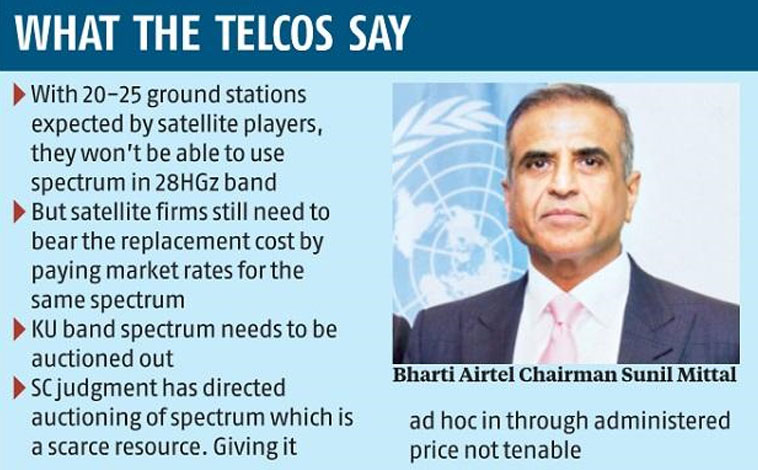Headlines of the Day
Spectrum at administered price, and not via auction for satellite players is not level playing field, say telcos
Rival telecom companies have challenged Bharti Airtel Chairman Sunil Mittal’s call for spectrum for satellite broadband to be given at an administered price instead of being auctioned.
Mittal had been speaking at the launch of more LEO satellites for his global satellite foray One Web a few weeks ago. He said that, with Airtel setting up only two ground stations for uplinking in rural areas, the requirement for spectrum was minimal and different from terrestrial mobile services where spectrum was needed across the country.
Reacting to this remark, an industry veteran said Mittal had omitted to mention that he will not be the only satellite player offering broadband.
“We expect another four to five players like Starlink, Amazon, Telesat and O3B to also come in. And as they have more satellites than One Web in the air, they will require more stations and our estimate is that collectively anything between 20-25 ground stations will be set up,” he said.
He pointed out that, based on current practice, ISRO requires an exclusion zone ranging from 50-200 kilometres around a satellite ground station where no telecom mobile tower can be set up to avoid interference.
“The 20 ground stations would cover the whole of India as there is an exclusion zone of over 200 kilometres around each station where a telco cannot put a 5G tower,” said another executive.
In short, telcos will not be able to co-exist and use the band between 28 GHZ to 29.5 GHZ which is valuable for 5G terrestrial services but is earmarked for satellite.

Telcos say there is a replacement cost for not being able to use this spectrum across the county for which they would have paid a hefty price in an auction. Satellite players cannot demand that the same spectrum be given to them at a nominal price as this would mean a substantial loss to the exchequer. They should also pay the market price and ensure a level playing field, say the telcos. Moreover, satellite companies like One Web will also be using the KU band to link customer terminals to the satellite. Therefore, the argument goes, this should also be auctioned like any other spectrum.
Currently the KU band is used by VSAT operators and, as part of the licence, it is offered spectrum at an administered price. But it is used for limited purposes such as running ATMs and demand is not huge.
But if the same band is now used by satellite players to offer broadband services and to compete with telcos in a similar service, then the satellite players cannot ask for spectrum at administered price, some experts argue.
“We fear that the satellite players want to expand the VSAT licence to include broadband services and continue to get the spectrum also through an administered price. This is absolutely not acceptable when telcos will be paying for spectrum through auction,” said another telco veteran.
Telcos also say that, according to a SC order, all spectrum is considered a scarce resource and needs to be auctioned. If this is so, then providing spectrum at an administered price in an ad hoc manner is not tenable for long.
Experts say that with the march of technology, some satellite companies are already working on 5G handheld devices which would work seamlessly on satellite as well as terrestrial networks. They also say that satellites will not only be used to connect remote areas or B2B products. It’s possible that telcos could have hybrid networks and use satellites in dark signal zones between cities as an alternative to laying down fibre for the last mile. Business Standard














You must be logged in to post a comment Login